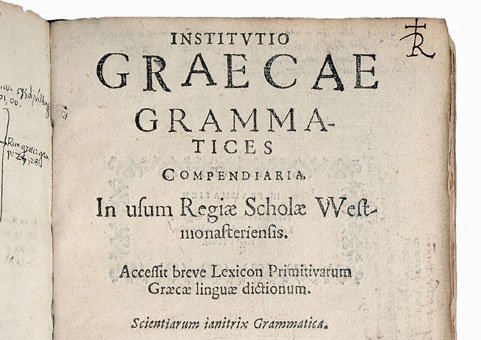Perseus digitized some Greek grammar resources early on (see below), but since then more has become available in .pdf form from thanks to Google Books and Archive.org. This survey for some reason does not include scans of books. One need in my view is for a good searchable school grammar of ancient Greek. The searchable ones currently available are of the more systematic variety, and are potentially bewildering to students and non-expert readers. Smyth and his 3048 chapters is not for everybody. The best choice in English in my opinion would be Goodell (see below). This spring DCC will be embarking on a project to digitize it properly, making it searchable, and integrating it into the notes of our forthcoming Greek commentaries. This will be done with crucial assistance from Bruce Roberson at Mount Allison University, and Rigaudon.
Another problem with the existing Greek grammar digitizations at Perseus is that the indices have not apparently been included. The index, as anyone who uses the print versions of these books will be aware, is the primary way that we consult these works, and not having the index amounts to a serious impediment to usability. Our Goodell will be browse-able via the index. And we are almost finished with a modification of the Perseus XML of Allen & Greenough’s New Latin Grammar that includes the index. We hope to make an index-browseable A&G available early in the new year.
Ok, here are some Greek grammars. Let me know your favorites, and if you think I am misguided in my love of Goodell.
Babbit, Frank Cole. A Grammar of Attic and Ionic Greek (New York: American Book Co., 1902). Google Books. archive.org
Buttman, Alexander. Grammar of the New Testament Greek (Andover: Warren F. Draper, 1891) at archive.org
Brugmann, Karl. Griechische Grammatik 3rd edition (Münich: Beck, 1900) at archive.org, and Google Books
Goodell, Thomas Dwight. A School Grammar of Attic Greek (New York: D. Appleton & Co., 1903) Google Books. Archive.org (better scan)
Goodwin, William W. Greek Grammar, revised and enlarged (Boston: Ginn & Co., 1896). Google Books.
Hadley, James. Greek Grammar for Schools and Colleges, revised and in part rewritten by Frederic De Forest Allen (New York: American Book Company, 1912) Google Books.
Meyer, Gustav. Griechische Grammatik, 2nd ed. (Leipzig: Breitkopf & Härtel, 1886) at archive.org and at Google Books (and another).
Monroe, D.B. A Grammar of the Homeric Dialect (Oxford: Clarendon, 1891) at archive.org.
These items are already available at Perseus:
Goodwin,William Watson. Syntax of the Moods and Tenses of the Greek Verb (London, Melbourne, Toronto 1889) Goodwin’s Moods and Tenses
Gildersleeve,Basil Lanneau. Syntax of Classical Greek from Homer to Demosthenes (New York 1900)
Smyth, Herbert Weir. A Greek Grammar for Colleges (1920) and (also at Philologic Chicago)
Kühner, Raphael, Friedrich Blass, and Bernhard Gerth. Ausführliche Grammatik der Griechischen Sprache (ed. Ildar Ibraguimov, Hannover und Leipzig, 1904).

I suppose I have been a traditional Smyth, but now that you review all these resources, I think I’ll check them all out more carefully. Do you also have a similar post about Latin lexica and grammars?
Thanks Chris Ann. I do not have a similar list for Latin grammars. I am assembling one for older Vergil school commentaries, which will probably become another post on these lines, so let me know if you have any favorites.
Dear Chris
Thanks for your survey. At the same time, can you introduce sources that write about the rationale behind the grammatical terms too?
Hi, Mostafa. Possibly! Can you give me an example of what you have in mind?
If you are still working on putting on-line commentaries on Vergil, let me put in a vote for Heyne’s (in Latin). I managed to come across a copy published in 1825 or so and have found it invaluable and not at all outdated. The Latin ynopsis of each book of the Aeneid is concise and very helpful.
Digitizing Latin commentaries on the Aeneid is certainly something I am interested in! In fact, I have a content type in Drupal all ready to go. The problem is that the proper digitization of the comments is time consuming and calls for considerable philological acumen. Perhaps if we had a team willing to edit the OCR, or just type the comments fresh, it would be doable over a long period. Let me know if you are interested in such a project.